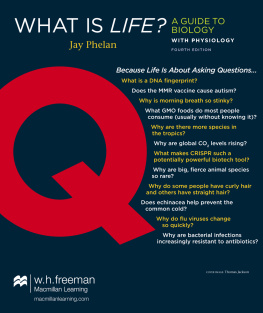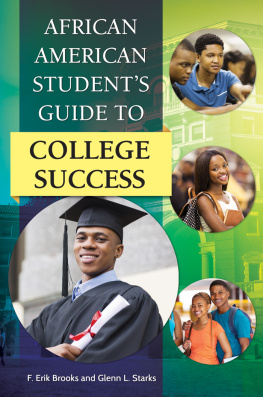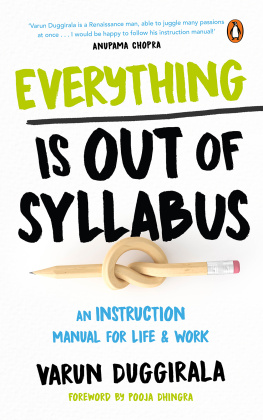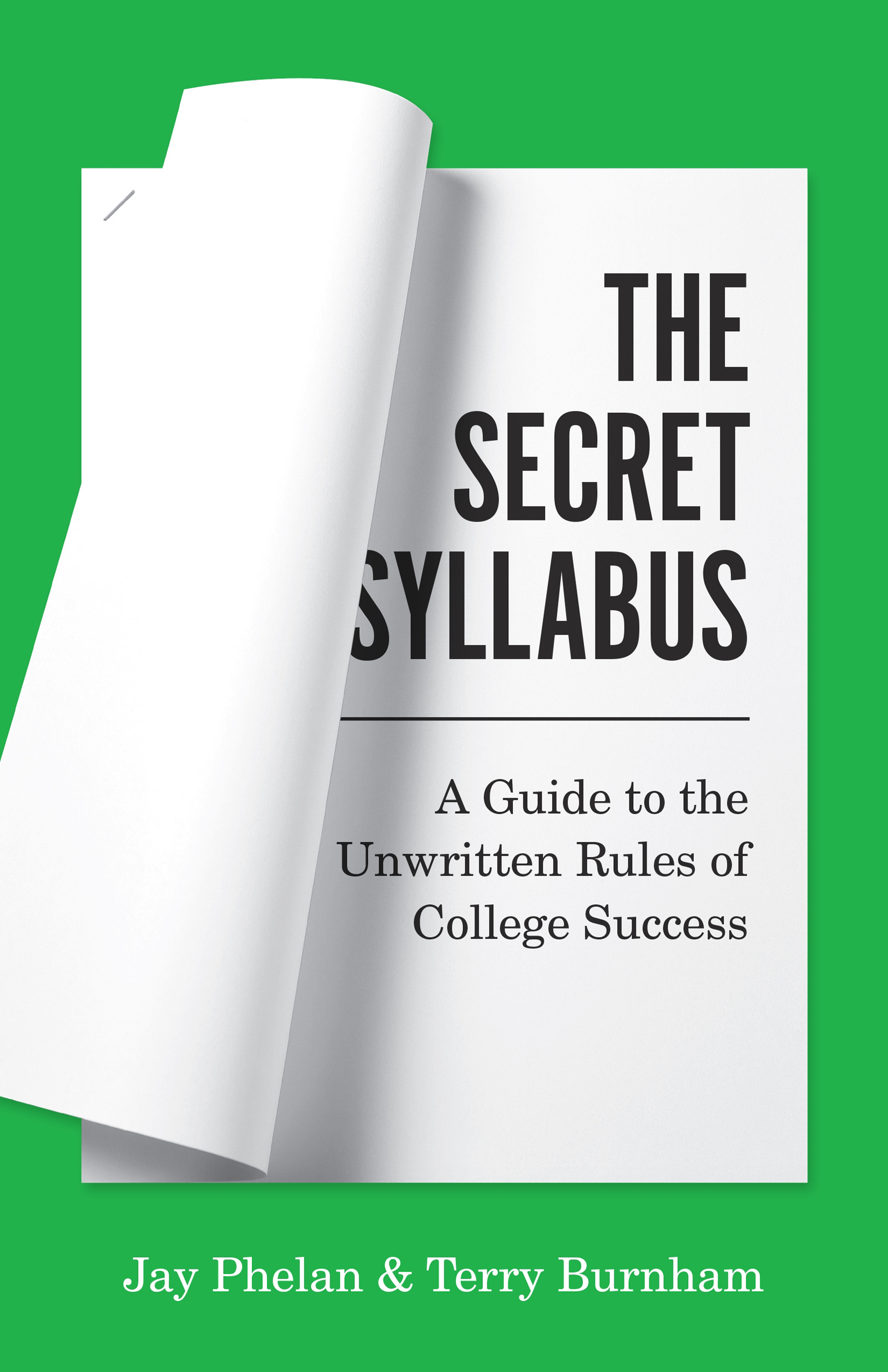Praise for
THE SECRET SYLLABUS
The Secret Syllabus is unlike any other book Ive read on preparing for college success. The stories and conversations are enjoyable and the authors dont just give advice, they explain how to do it. If you have questions about the culture of your college before you even get started, this book is a must-read.
Shellee Howard, CEO of College Ready
Uniquely personal and exquisitely readable. Navigating the secret curriculum of higher education is nebulous and difficult, but aspiring college students should look no further than The Secret Syllabus to set themselves up for a successful (and happy) journey forward. This is a book I wish I had when I was starting out in college.
Sagar Desai, MD, Teach For America
The Secret Syllabus should have been titled Rules for Life. The authors take us on a tour of student life in academia and distill the skills necessary for freshmen to thrive. At a time when students seem increasingly ridden with anxiety, this book throws them a lifeline they can grasp. I will definitely recommend this book to my freshmen.
Daniele Struppa, President of Chapman University
I speak with many college students who are interested in the FBIs Behavioral Analysis Unit. I will add this book to the list of must-reads. Phelan and Burnham have written a dynamic road map for successfully navigating the challenging college years. From setting goals to career planning and every step in between, they are there guiding you with specific, actionable behaviors you should do to achieve your goals and dreams.
Kristen Slater, Special Agent and Unit Chief of the FBIs Behavioral Analysis Unit
The Secret Syllabus covers it all, from the big ideas for living life fully to the small navigations of daily college life. Its a great read for students looking for the secrets for success in college and choosing a career path that is the right fit for them. Who wouldnt want that?
Roxanne G. Neal, Assistant Dean and Director of the New Student and Transition Programs at UCLA
I know from my twenty years of experience teaching at Harvard that academic excellence requires far more than acing the material. The Secret Syllabus will teach you how to create positive and effective relationships with your faculty. You will learn how to talk to your professors, what to do in office hours, how to stay in touch without being a burden, and much, much more.
Carole Hooven, Codirector of Undergraduate Studies, Department of Human Evolutionary Biology, Harvard University
THE SECRET SYLLABUS
SKILLS FOR SCHOLARS
The Secret Syllabus: A Guide to the Unwritten Rules of College Success, Jay Phelan and Terry Burnham
The Economists Craft: An Introduction to Research, Publishing, and Professional Development, Michael S. Weisbach
The Book Proposal Book: A Guide for Scholarly Authors, Laura Portwood-Stacer
The Princeton Guide to Historical Research, Zachary M. Schrag
You Are What You Read: A Practical Guide to Reading Well, Robert DiYanni
Super Courses: The Future of Teaching and Learning, Ken Bain
Syllabus: The Remarkable, Unremarkable Document That Changes Everything, William Germano and Kit Nicholls
Leaving Academia: A Practical Guide, Christopher L. Caterine
A Field Guide to Grad School: Uncovering the Hidden Curriculum, Jessica McCrory Calarco
How to Think like Shakespeare: Lessons from a Renaissance Education, Scott Newstok
The Craft of College Teaching: A Practical Guide, Robert DiYanni and Anton Borst
Will This Be on the Test? What Your Professors Really Want You to Know about Succeeding in College, Dana T. Johnson with Jennifer E. Price
THE SECRET SYLLABUS
A Guide to the Unwritten Rules of College Success
Jay Phelan & Terry Burnham
PRINCETON UNIVERSITY PRESS
Princeton and Oxford
Copyright 2022 by Princeton University Press
Princeton University Press is committed to the protection of copyright and the intellectual property our authors entrust to us. Copyright promotes the progress and integrity of knowledge. Thank you for supporting free speech and the global exchange of ideas by purchasing an authorized edition of this book. If you wish to reproduce or distribute any part of it in any form, please obtain permission.
Requests for permission to reproduce material from this work should be sent to
Published by Princeton University Press
41 William Street, Princeton, New Jersey 08540
99 Banbury Road, Oxford OX2 6JX
press.princeton.edu
All Rights Reserved
Library of Congress Cataloging-in-Publication Data
Names: Phelan, Jay, author. | Burnham, Terry, author.
Title: The secret syllabus : a guide to the unwritten rules of college success / Jay Phelan and Terry Burnham.
Description: Princeton, New Jersey : Princeton University Press, 2022. | Series: Skills for scholars | Includes bibliographical references and index.
Identifiers: LCCN 2021049279 (print) | LCCN 2021049280 (ebook) | ISBN 9780691224428 (paperback) | ISBN 9780691224404 (hardcover) | ISBN 9780691224411 (ebook)
Subjects: LCSH: College student orientationUnited States. | Academic achievementUnited States. | Study skillsUnited States. | BISAC: EDUCATION / Higher | STUDY AIDS / College Guides
Classification: LCC LB2343.32 .P54 2022 (print) | LCC LB2343.32 (ebook) | DDC 378.1/980973dc23/eng/20211116
LC record available at https: / /lccn.loc.gov/2021049279
LC ebook record available at https: / /lccn.loc.gov/2021049280
Version 1.0
British Library Cataloging-in-Publication Data is available
Editorial: Peter Dougherty, Alena Chekanov
Production Editorial: Terri OPrey
Text and Cover Design: Chris Ferrante
Production: Erin Suydam
Publicity: Alyssa Sanford, Kathryn Stevens
Copyeditor: Michelle Garceau Hawkins
Jacket image: Shutterstock
Contents
- vii
Preface
Speaking to the Womens Club of Rio de Janeiro in 1954, the anthropologist Kalervo Oberg presented the idea of culture shock for the very first time.
Culture shock is precipitated by the anxiety that results from losing all our familiar signs and symbols of social intercourse. These signs or cues include the thousand and one ways in which we orient ourselves to the situations of daily life All of us depend for our peace of mind and our efficiency on hundreds of these cues, most of which we do not carry on the level of conscious awareness.
Now when an individual enters a strange culture, all or most of these familiar cues are removed. He or she is like a fish out of water. No matter how broad-minded or full of good will you may be, a series of props have been knocked from under you, followed by a feeling of frustration and anxiety.
Oberg was addressing the wives of American engineers who had recently been stationed in Brazil. His intention was to help them better understand what they were experiencing as they struggled to adapt to life in another culture, far from what they had considered home.
The anthropologist just as easily could have been describing the Welcome to College situation that occurs each fall on campuses across the world. Because college, too, is a foreign culture to the newly arriving students and, as with other cultures, it operates with written, as well as unwritten, rules.







